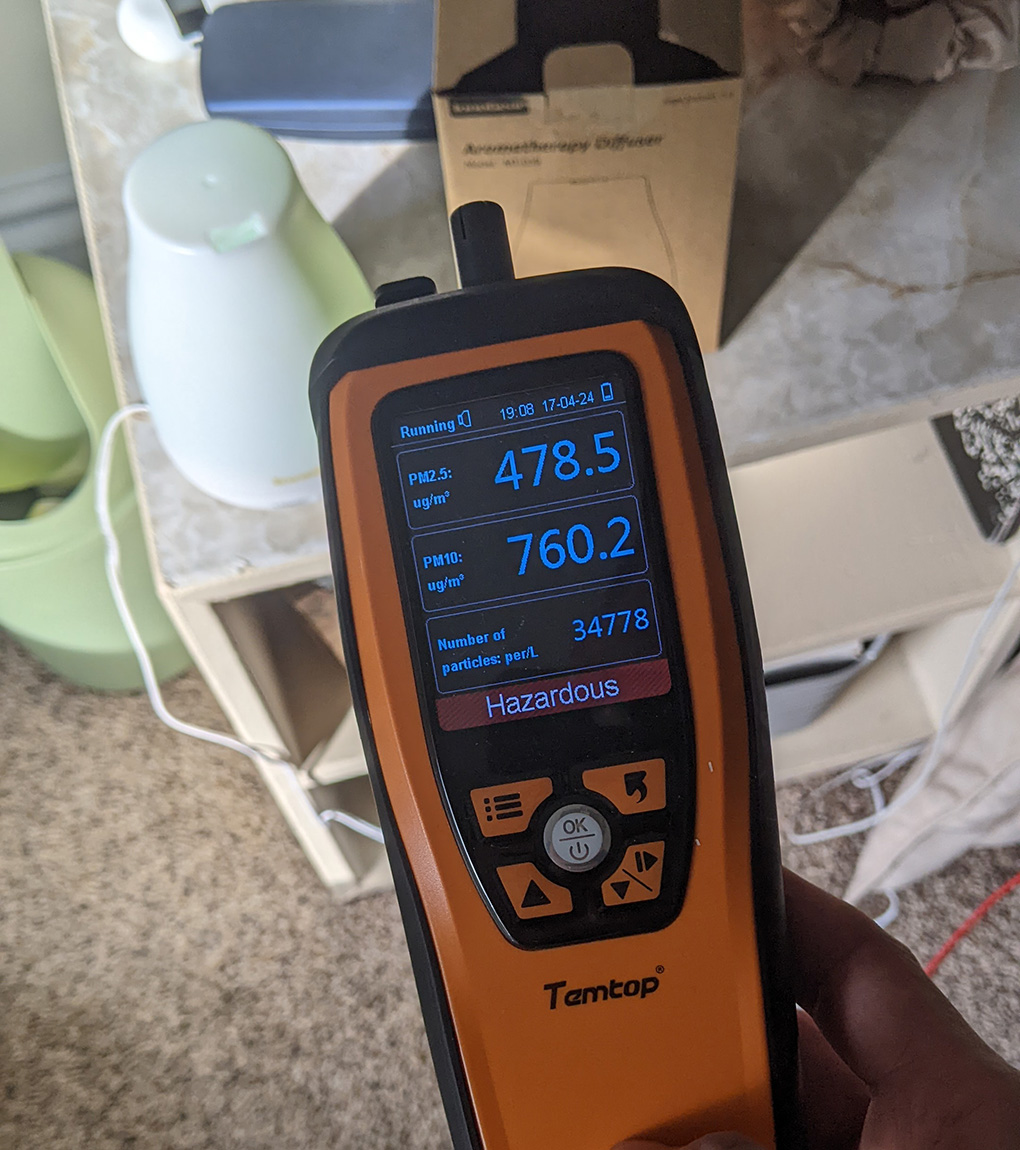Aroma Diffusers Could Be Causing Air Quality and Nuisance Alarm Issues
. Posted in News - 2 Comments
By Kimberly Rau, MassLandlords, Inc.
Fragrance oil or aromatherapy diffusers may be causing nuisance alarms and indoor air quality issues in your rentals. If your tenants are reporting the smoke detector is going off, but they aren’t cooking or smoking, read on to learn about why that cheerful little fragrance diffuser might not be as innocuous as you think.

The air quality monitor doesn’t lie: Not only was this fragrance diffuser setting off the smoke alarm, but it was also creating hazardous air quality conditions in the home. (License: CC by-sa MassLandlords Quattrochi)
Aroma Diffusers May Cause Nuisance Alarms
Aromatherapy is big business in America. Aroma diffusers had a market size of nearly $1.7 billion in 2022 and a projected value of more than $3.6 billion by 2031. With diffusers being used in homes and offices throughout the country, there’s a good chance that a few of them belong to your renters.
There are passive ways to release essential oils into the air, including reed and stone diffusers. But many aroma diffusers are electric; they work by vaporizing or aerosolizing oils and releasing the scent or droplets into the air.
While this is an efficient way to make the most of an aromatic oil, the smoke detectors in your rentals may not be able to differentiate between particulate from a diffuser and actual smoke. This in turn could lead to nuisance alarms.
MassLandlords Executive Director Doug Quattrochi recalled a situation where the smoke alarm was suddenly going off in one of his triple-decker units. The new tenants weren’t smokers, and Quattrochi found no reason to doubt them. There was no evidence of any kind of smoking occurring in the unit. The oven was clean, and the renters said they hadn’t used it. But the alarm kept going off.
Quattrochi brought his air quality monitor, a device that detects particles, to the unit. (Note: this is not an affiliate link. We do not receive any commission if you purchase this air quality monitor.) The problem turned out to be an aroma diffuser that, similar to an air humidifier, was spraying droplets into the air. When the unit was not in use, the alarms did not go off.
If your renter has a humidifier-style diffuser that aerosolizes aromatic oils, and they don’t want to get rid of it, tell them that they can attempt to run it far from any kind of smoke detector or sprinkler system. But this isn’t a sure thing: In Quattrochi’s tenants’ situation, the diffuser was not near a smoke detector. Yet it filled the room in such a way that even the smoke detector that was farthest away was still detecting particles in the air.
Aroma Diffusers Can Create Poor Indoor Air Quality
Aroma diffusers have become incredibly popular, and it’s no surprise. Aroma oils can make a room smell wonderfully fragrant, and people who use essential oils instead of just fragrance oils also claim relaxation benefits from the scent. But are these diffusers actually good for you?
Any time you release particulates into the air, you are disrupting the air quality in your home. New construction has become more energy efficient, allowing less heated or cooled air to escape from the interior. Unfortunately, that also means more pollutants get trapped inside. If you run an aroma diffuser, those particulates are going to hang around just like cigarette smoke would.
Quattrochi’s air quality monitor was able to pick up atmospheric changes from the aroma diffuser, and a 2022 study published by the National Library of medicine corroborates his findings.
“Essential oil products are increasingly used in indoor environments and have been found to negatively contribute to indoor air quality. Moreover, the chemicals and fragrances emitted by those products may affect the central nervous system and cognitive function,” the abstract for the study states.
In fact, most of the sources suggesting essential oil diffusers are helpful seem to be websites that are selling essential oils. One goes as far as to suggest “essential oil diffusers can improve indoor air quality by releasing fragrant essential oils into the air.” There are people who enjoy the smell of gasoline, too, but we wouldn’t suggest you keep an open fuel can in your living room (for a variety of reasons).
Some of the most popular essential oils may lead to hormonal imbalances.
Air quality issues aside, certain essential oils have been found to have components that potentially act as endocrine disruptors, including lavender and tea tree oils, according to the National Institute of Environmental Health Sciences (NIEHS).
“Lavender oil and tea tree oil could pose potential health exposure concerns and should be researched further, especially because these oils are available without a written prescription from medical professionals and they’re not regulated by the Food and Drug Administration,” wrote a lead researcher for the NIEHS study.
Keep this in mind if you go to purchase essential oils. Certain companies may try to claim their oils are “pharmaceutical grade,” or use other similar terms to imply their oils have met some specific criteria to earn a designation. This is a meaningless designation, as there is no official entity that “grades” essential oils. Scientific American has noted that we have no evidence that any essential oils can cure disease, though some may improve symptoms of various ailments.
Don’t Humidifiers Release Droplets into the Air, Too?
Regular humidifiers can certainly set off dust detectors just like aroma diffusers, but the difference between the two appliances lies in what they release. Water humidifiers running on distilled water release droplets of water into the air, which can be detected as smoke. However, if you inhale one of those droplets, it’s just water, and no different from breathing outside on a foggy morning.
If, however, your humidifier runs on tap water, it likely has dissolved minerals, such as salts, that can end up aerosolized once the water evaporates. Then, what you are inhaling is quite similar to the particles you inhale from aroma diffusers. They are legitimate PM (particulate matter) 2.5 dust particles. Breathing those in high enough concentrations can be as bad for your lungs as smoking.
If you or a renter runs a humidifier for winter comfort, best practice is to pair that with a whole room HEPA filter.
Conclusion
We aren’t implying fragrance oil diffusers cause the same problems that come from smoking inside the rental. Aroma diffusers may leave some residue, but are unlikely to stain your walls or cause permanent damage. But there is evidence to suggest that they may cause problems, even minor ones, for you and your tenants.
If this is the case for your rental – that is, if you are responding to multiple nuisance alarms not related to cooking or smoking – request your renters use them farther away from smoke detectors. If this does not solve the issue, and you can’t find any other culprits for those unexplained alarms, your renters may need to discontinue using them entirely.




